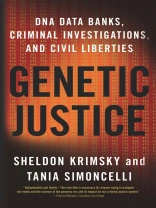National DNA databanks were initially established to catalogue the identities of violent criminals and sex offenders. However, since the mid-1990s, forensic DNA databanks have in some cases expanded to include people merely arrested, regardless of whether they’ve been charged or convicted of a crime. The public is largely unaware of these changes and the advances that biotechnology and forensic DNA science have made possible. Yet many citizens are beginning to realize that the unfettered collection of DNA profiles might compromise our basic freedoms and rights.
Two leading authors on medical ethics, science policy, and civil liberties take a hard look at how the United States has balanced the use of DNA technology, particularly the use of DNA databanks in criminal justice, with the privacy rights of its citizenry. Krimsky and Simoncelli analyze the constitutional, ethical, and sociopolitical implications of expanded DNA collection in the United States and compare these findings to trends in the United Kingdom, Japan, Australia, Germany, and Italy. They explore many controversial topics, including the legal precedent for taking DNA from juveniles, the search for possible family members of suspects in DNA databases, the launch of ‘DNA dragnets’ among local populations, and the warrantless acquisition by police of so-called abandoned DNA in the search for suspects. Most intriguing, Krimsky and Simoncelli explode the myth that DNA profiling is infallible, which has profound implications for criminal justice.
สารบัญ
Foreword
Acknowledgments
Introduction
Part I: DNA in Law Enforcement
1. Forensic DNA Analysis
2. The Network of U.S. DNA Data Banks
3. Community DNA Dragnets
4. Familial DNA Searches
5. Forensic DNA Phenotyping
6. Surreptitious Biological Sampling
7. Exonerations
8. The Illusory Appeal of a Universal DNA Data Bank
Part II: Comparative Systems
9. The United Kingdom
10. Japan’s Forensic DNA Data Bank
11. Australia
12: Germany
13. Italy
Part III: Critical Perspectives
14. Privacy and Genetic Surveillance
15. Racial Disparities in DNA Data Banking
16. Fallibility in DNA Identification
17. The Efficacy of DNA Data Banks
18. Toward a Vision of Justice
Appendix: A Comparison of DNA Databases in Six Nations
Notes
Selected Readings
Index
เกี่ยวกับผู้แต่ง
Sheldon Krimsky is professor of urban and environmental policy and planning and adjunct professor of public health and community medicine at Tufts University. He is author or coeditor of eleven books, most recently Race and the Genetic Revolution: Science, Myth, and Culture.Tania Simoncelli worked for more than six years as the science advisor to the American Civil Liberties Union, where she guided the organization’s responses to cutting-edge developments in science and technology that pose challenges for civil liberties. She currently works for the U.S. Food and Drug Administration.










